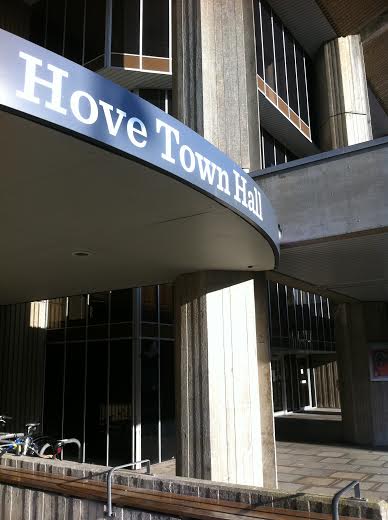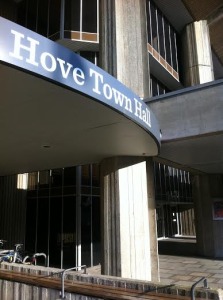Council tax in Brighton and Hove is expected to rise by 2.99 per cent next year, the Labour council leader Daniel Yates said today (Wednesday 28 November).
This is the highest rise that Brighton and Hove City Council expects to be able to impose for 2019-20 without the need for a local referendum.
The bill for a band D home is expected to rise almost £54 a year from April – or just over £1 a week – from £1,805.98 to £1859.98.
Councillor Daniel Yates, blamed the need for the increase on continuing cuts to the government grants that previously paid for much of the work carried out by councils.
He said that the council would receive just over £14 million in “revenue support grant” – down about £7 million since last year and by an estimated £40 million in four years.
Over that four-year period the council has had to make savings or find extra money to make up a £111 million shortfall caused by a rising demand for services, higher costs and loss of income.
The council drew up its draft spending plans needing to plug a budget gap of £14.2 million.
This was in part because of “the increasing level of social care pressures and a further reduction in the government’s education services grants”.
But savings of £12 million had been identified, bringing the shortfall down to £2.15 million, Councillor Yates said.
As a result, 70 jobs were expected to go. Some of those job cuts would come from the library service, with the council looking to expand the number of volunteers and its Libraries Extra scheme to keep them open while making £242,000 in savings.
Residential respite care and short breaks currently face a £140,000 cut. Councillor Yates said that these were in the draft budget proposals but may not make it into the final budget papers.
And although the draft budget included the proposed 2.99 per cent council tax rise, this would fund just 18 per cent of the council’s £756 million annual budget.
A further 39 per cent comes from government grants specifically set aside for schools and housing benefit payments.
And a further 7 per cent comes from council tenants’ rents and is ring-fenced for housing.

Councillor Yates said: “It is a significant challenge to meet the expectations of the 300,000 residents of Brighton and Hove and its 11 million visitors
“We do not underestimate the level of expectations people have.
“We have protected the city’s services from the worst impacts of austerity.
“We have also been able to save city services from some of the rash decisions made in other areas.
“We are in a slightly better place than some of the counties are. Other authorities in the region are making direct pleas to government for more funding.”
But the council leader gave a warning about the impact of a potential hard Brexit. It could lead to 4,000 job losses in the three local parliamentary constituencies, he said.
He described Brexit – Britain’s departure from the European Union (EU) – as the “biggest genuine threat to local government”.
According to research published in the UK Trade and Policy Observer by Sussex University and Chatham House, 1,300 jobs would go in Hove, 1,200 in Brighton Kemptown and 1,600 in Brighton Pavilion.
He said: “That piece of work quite frankly is frightening. For me it is frightening when it comes to delivering services.
“Seventy per cent of this city did not vote for Brexit – so a significant number of people who are frightened by any form of Brexit.”
Councillor Yates said that the consequences were stark, with the highest percentage of job losses concentrated in the professions and with more than 10,000 jobs at risk in Sussex and Hampshire.
He said that among the most important organisations and industries supporting Brighton and Hove’s economy, the digital, financial and insurance sectors faced 6,000 losses across the two counties.
Public services, including education and health, faced more than 9,000 job losses, in areas that he described as important to families.
He said: “When you look at the impact of that, it is not just the council’s financial future that a ‘no deal’ Brexit threatens.
“That uncertainty is a game of Russian roulette with real families’ income and lives.
“The financial stability of 4,000 families across the city hangs on the (Brexit) decision.”

Councillor Yates praised his predecessor as leader of the council – Warren Morgan – for helping to ensure that Brighton and Hove was in a better position than many other councils.
Councillor Morgan was credited with backing a four-year budget deal that had made easier for council chiefs to plan for the fallout from the government’s austerity policies.
Councillor Yates said: “Taking that four-year approach and building a four-year budget rather than working on a day-to day year-to-year basis budget has helped us as a city be more resilient than other areas around the south east and around the country to the impact of government cuts and the pressures facing us.”
He said that one in ten local authorities faced a financial “cliff edge”, saying that Brighton and Hove’s longer-term approach had enabled the council to protect more services.
He was frustrated that the council still did not know what its income would be after 2019-20 as the government had not yet said how much it would pay towards local government services.
He said: “We were promised two years ago, promised again last year and promised imminently. I keep hearing an imminent settlement is about to be announced.
“Quite frankly, I have given up hope now. All that we have seen is ongoing cuts to the financial settlement we get from central government – and we have no idea what our ability is to raise income or deliver the services after 2020.
“All local authorities are up in arms.”
The draft budget is on the agenda for the council’s Policy, Resources and Growth Committee meeting at Hove Town Hall on Thursday 6 December. The meeting, which is open to the public, is due to start at 4pm.
More information about the budget is available from www.brighton-hove.gov.uk/bhbudget.










I am more than happy to pay for a reasonable rise but, we need more from this council. They need to dramatically reduce wasteful spending.
Yet they are prepared to spend £2m of Council Taxpayers money on The Aquarium Roundabout fiasco.